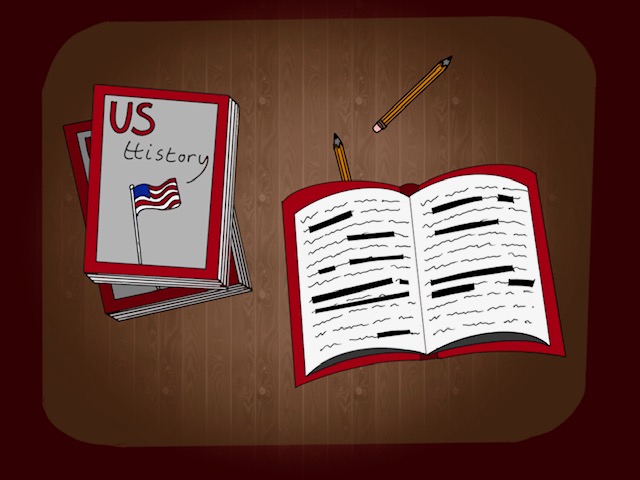Censorship moves affect schools
March 6, 2023
A classroom full of students ready to learn, but what they learn could be tough to hear. Sometimes censorship is considered for controversial subjects like these.
Many times throughout history, censorship has been used by the government. Most uses were for security reasons, whether it was the Alien and Sedition Acts in the early days of American history or the Sedition acts during the first world war. Now, censorship is in the news again after recent changes made to the AP curriculum.
After recent changes to the AP African American Studies curriculum because of pressure from Florida Governor, Ron DeSantis, conversation around censorship has become increasingly prominent. Although no legal action occurred, DeSantis applied verbal pressure that caused the College Board to inevitably change the course’s curriculum.
AP U.S. history teacher, Connie Yaccarino, who teaches history including the history of censorship in the U.S., spoke on the legality of censorship and the when and why of it in U.S. history.
“Censorship is just a term we would use to describe some sort of limitation that’s done institutionally,” Yaccarino said.
Yaccarino said that censorship can be done on many different levels. Whether it’s personal, educational, or even on a government level, censorship can be done legally. In the case of the change by College Board, censorship took place because certain topics are up for debate on whether or not they are allowed to be taught in schools.
“You get into different interpretations of what schools can or cannot do based on what is expected of the appropriateness of schools,” Yaccarino said, “like the Hazelwood v. Kuhlmeier case and things like that.”
Because of several controversial court cases, such as the aforementioned Hazelwood, and a landmark censorship case, Morse v. Frederick, censorship of topics deemed too controversial or inappropriate to be taught in school can be banned.
These bannings take place on a state by state basis, where a county, or state, can ban a specific set of subjects from their schools.
As Yaccarino said, censorship has been enforced throughout the United States’ history, however most recently it’s also taken place on the internet.
Many social media websites have terms of services that act as a way to limit their users speech. Whether it be speech deemed hateful, or illegal acts, content unfit for the terms of service can be banned.
Students like senior Hayden Radford believe that censorship is generally dangerous and should not be thrown around so lightly. He thinks it should be used as a tool to correct false information, and not a weapon to wield against anyone and everything.
“As far as opinions go, I don’t think anyone should be censored,” Radford said.
He also believes that some forms of censorship are needed.
Radford is of the belief that anyone should be allowed to say whatever they believe, however if someone is stating something as fact, it needs to be fact checked.
“If you’re going out saying like, ‘oh yeah, the president of the United States said this right’, and it’s just completely wrong. I feel like that should be censored or at least flagged… Cause people can see it, but they know that it’s false information,” Radford said.
Radford believes that some things shouldn’t be said, and because of that those things should be censored, however what he believes should be top priority is stopping the spread of false information.
“I feel like we should be able to trust people to do the right thing,” Radford said, “So I think it’s definitely a good thing to have a little bit of censorship.”
Censorship isn’t just an issue of the everyday person, it’s a topic that has recently taken center stage in regards to schooling and education.
With the recent changes to the AP curriculum, educators like English teacher Meghan Randinelli, are worried about the increase in censorship over the past few years.
“I’m scared that they’re gonna take certain things out of the curriculum, and I don’t think that that is fair,” Randinelli said.
Randinelli is scared about the potential erasure of historical elements that may be deemed too controversial or uncomfortable from her courses.
Much of Randinelli’s coursework is centered around things considered controversial, books that have complicated topics and lots of intersectionality.
With recent debate over such topics, Randinelli feels it’s vital to keep discussing topics, regardless of how scary or controversial they may be.
“People are always gonna be uncomfortable. It’s just about… how you deal with that discomfort. And I think one of the biggest concerns that I have is that certain things that need to be talked about will not be talked about anymore,” Randinelli said.
Like all topics covered in the classroom, topics that are seen as controversial need to be covered in a safe and unbiased way. For Randinelli, it’s all about covering reality and not veering off into opinion.
“I think you can do it as long as you present the facts, and I think that’s one of the biggest things,” Randinelli said. “It’s presenting the history immediately.”
